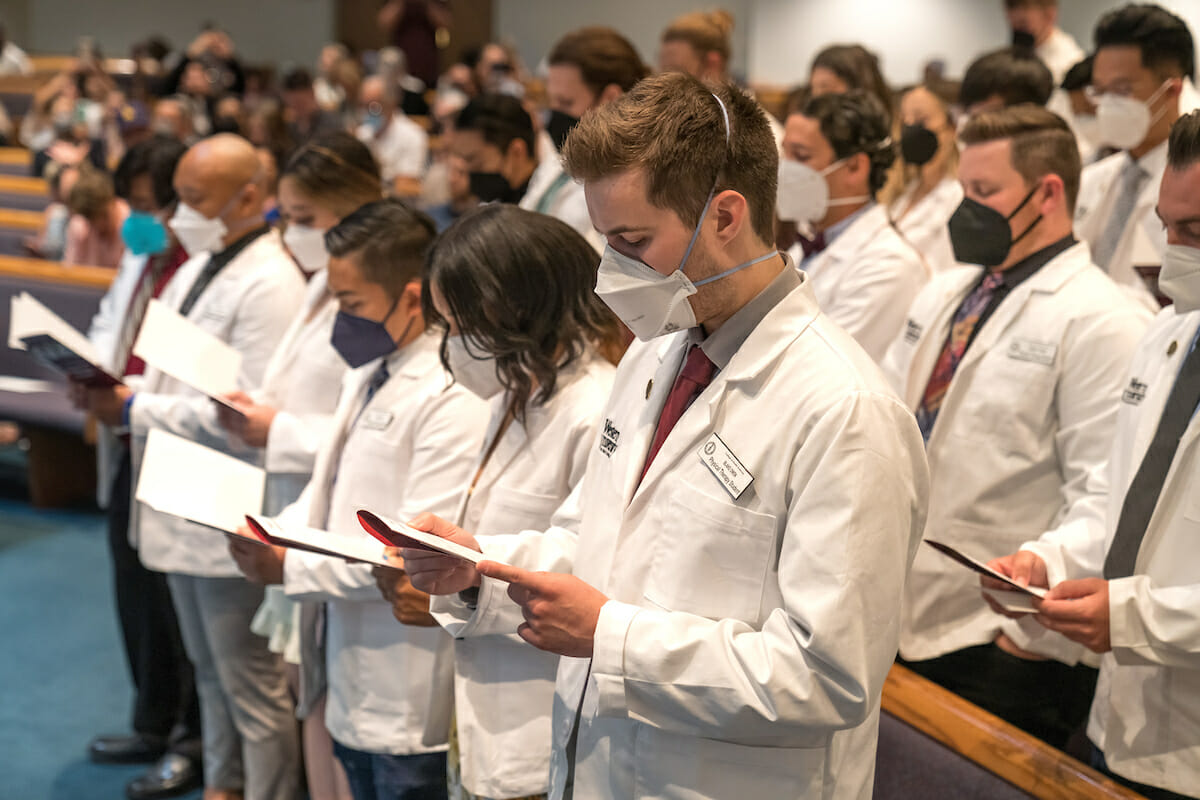
Department of Education
Loan Programs and Interest Rates
To receive a Federal Direct Unsubsidized Loan or Grad PLUS Loan students must meet the basic eligibility requirements for FSA funds: be a U.S. citizen or permanent resident, a valid Social Security number, must be enrolled at least half time, not be in default on any student loans and meeting satisfactory academic progress.
Students must apply for the Free Application for Federal Student Aid (FAFSA). All students interested in financial aid will need to complete the FAFSA.
Federal Direct Unsubsidized Loans: are available to undergraduate and graduate students from the Direct Loan Program and guaranteed by the federal government. However, the federal government does not pay the interest while the student is in school. Students must be eligible citizen.
Interest rates have a “variable-fixed” rate. The rate would be fixed until the loan is paid in full. Interest rates will be established on July 1, for the upcoming academic year. For the 2025/2026 academic year the interest rate is 7.94% which starts accruing interest as soon as the funds are disbursed to the university. Please remember, that the interest rate for the 2026/2027 academic year may differ based on what the 10-Year T-Bill will be by the end of May 2026.
Increased Annual Unsubsidized Loan Limits: Western University participated in the Health Education Assistance Loan (HEAL) program before its phase out in 1998. As a result, the school may award the increased unsubsidized amounts to students who are enrolled full-time in a health professions discipline that was eligible under the HEAL program and is accredited by an approved accrediting agency. Because the increased annual unsubsidized loan limits are intended to replace funds that would have been available previously under the HEAL program, the annual loan limits for the increased unsubsidized amounts are the same as the HEAL program annual loan limits.
The maximum annual Unsubsidized loan limits (for graduate professional students) as per the Department of Education the unsubsidized amount/limits are based on the number of months of enrollment. Unsubsidized loans for a 12 month program are 46,167, 11 month programs are 44,944, 10 month programs are 42,722. All Nursing programs maximum unsubsidized amount is 20,500 as well as all certificate programs, and MSMS, MSPA, DPT, PHDBPS and MSBPS.
If programs are less than 10 months long the unsubsidized amount will be prorated as per federal regulations.
Unsubsidized amounts are subject to change based on the number of months of enrollment.
Grad PLUS Loan: are available to graduate students from the Direct Loan Program and guaranteed by the federal government. However, the federal government does not pay the interest while the student is in school.
Interest rates have a “variable-fixed” rate. The rate would be fixed until the loan is paid in full. Interest rates will be established on July 1, for the upcoming academic year. For the 2025/2026 academic year the interest rate is 8.94% which starts accruing interest as soon as the funds are disbursed to the university. Please remember, that the interest rate for the 2026/2027 academic year may differ based on what the 10-Year T-Bill will be by the end of May 2026.
Federal student loans are required by law to provide a range of flexible repayment options, including, but not limited to, income-based repayment and income-contingent repayment plans, and loan forgiveness benefits, which other student loans are not required to provide. Please go to our Repaying Your Student Loans page on this site for more information on repayment plans.
Federal Direct loans are available to students regardless of income.
- The Grad PLUS Loan will be awarded to students with an unmet need to fill the gap in their budget (please refer to your award letter offer for your actual award eligibility amounts).
- Packaging and Award Policy Students at Western University of Health Sciences are packaged and awarded as independent graduate students. There are no Grants available to graduate students. Resources such as gift aid, scholarships, Military and the National Health Service Corps will be taken into consideration first when packaging and awarding students. all eligible students are then awarded in the unsubsidized loan and the balance in the Grad PLUS loan to meet the maximum of their budget. Students are awarded the maximum allowable in the Federal Direct Loan program’s as per their program and the Department of Education.
Students will be notified via Western University email of their award offer notice. All subsequent award offers or changes to the award offer will generate an additional or revised award letter notice.
Students may accept all or a partial amount of their award offer. When accepting your loans, students should always accept the loan with the lowest interest rate first (unsubsidized) and then the Grad PLUS Loan. Scholarships will always be taken into consideration first when awarding the student.
Western University is a graduate/professional university and is not eligible for Pell Grants.
Because students sometimes make errors on their application, there is a process for verifying applications and making corrections. The Central Processing System (CPS) selects which applications are to be verified. As per federal regulations the school must verify the all student files selected for verification.
The school may require the student to verify FAFSA information and to provide reasonable documentation. If selected for verification the Financial Aid Office will contact the student via the WesternU email address, the student will need to follow the instructions in the email notification by completing one of the verification tracking group worksheets. Students will need to adhere to any deadlines for completing documentation in a timely manner so that their financial aid is not delayed.
Federal regulations prohibit students from being awarded beyond the cost of attendance established for their program. An overaward occurs when a student receives resources (such as scholarships or grants) in addition to federal funding and the combined award exceeds the student’s financial need established by the cost of attendance. Federal regulations require that overawards be eliminated as they are discovered. Overawards that are found before financial aid has been disbursed must be eliminated prior to any disbursement by reducing financial aid.
Students will be notified when they are overawarded and funds are being reduced or canceled to eliminate the overaward.
A borrower who has reached his or her aggregate borrowing limit may not receive additional loans. Once the loans are repaid, in full or in part, the borrower may apply for additional unsubsidized loans. Outstanding loans include student loans received while the student completed undergraduate and graduate work. In the case of Consolidation loans, the outstanding amounts of any underlying unsubsidized loans are counted towards the loan limits. The total loan debt a student may have outstanding from all loans (subsidized and unsubsidized) differs depending on their program.
- $138,500 for the DPT, MSPA, MSMS, MSBPS and PHDBPS and all Nursing programs, no more than $65,500 of this aggregate amount may be in the form of subsidized loans.
- $224,000.00 for the DO, Dental, Podiatry, Optometry, PharmD and Vet Med programs.
Western University of Health Sciences fiscal year 2022 Draft Cohort Default Rate is 0.0 percent, as per the United States Department of Education.

Rights and Responsibilities
The FWS program provides funds for part-time jobs which allow students to earn money needed to pay for educational expenses. FWS awards are a form of federal financial aid. In order to be eligible students must have completed a current FAFSA, have remaining “unmet need”, be a permanent or U.S. citizen, be in good academic standing and be enrolled at least half-time. Positions are available on campus. Students are encouraged to find positions that provide work experience in their field of study or provide valuable service to the community.
You May cancel or reduce the amount of your loan by writing to your school’s financial aid office or lender before your lender sends your money to your school. There are also two ways to cancel all or part of your loan after your loan money is sent to your school. You may contact the school within 14 days of the date the school informs you they have applied your loan to your account or you can pay back all or a part of your loan within 120 days of the date your lender sends your loan money to your school.
As per federal regulations and institutional policies, financial aid recipients must meet all Satisfactory Academic Progress (SAP) standards as established by each college in order to continue to receive financial aid. SAP is measured at the end of each payment period to ensure that the student is making reasonable academic progress to meet graduation requirements.
The standards of measurements in assessing satisfactory academic progress are:
Qualitative – Cumulative grade point average – Students are required to maintain a minimum cumulative GPA throughout their program while attending WesternU.
Quantitative/Pace – Pace is the rate at which a student completes requirements for their educational goal and is calculated by dividing the number of cumulative units completed by the number of cumulative attempted. Students must progress through their program to ensure that they will graduate within the maximum timeframe (as specified by each college
If a student is not making Satisfactory Academic Progress (SAP) they will be placed on “Financial Aid
Warning” status for the next payment period and continue to receive financial aid for that period.
Financial Aid is any financial assistance offered to the student for paying for their education, such as loans, scholarships, Federal Work-Study, Grants and stipends (based on the criteria of the stipend). Students who fail to make SAP by the end of that payment period lose financial aid eligibility.
It is the policy of the Financial Aid Office (FAO) that once a student has been placed on academic probation for not meeting SAP standards as defined by the college, the Financial Aid Office will automatically place the student in a Financial Aid Warning status. During the next academic term if the student does not meet SAP standards and the college places the student on academic suspension the student will no longer be eligible for financial aid. If the student appeals the academic suspension and the appeal is approved, financial aid will be reinstated. If the student is directed to audit courses; those courses will not be covered by financial aid. Students that are required to repeat coursework are encouraged to meet with a financial aid counselor with respect to their financial aid eligibility.
Please note – students need to be aware, that if you are placed on a suspension or dismissal, the financial aid funds received may have to be returned to the university.
Failure to return unearned funds in full may result in a collections agency referral, inability to receive future financial aid disbursements, and may prohibit future enrollment.
If you are considering taking a leave of absence or any time off from class, you should meet with a financial aid counselor first to find out how this may affect your financial aid.

